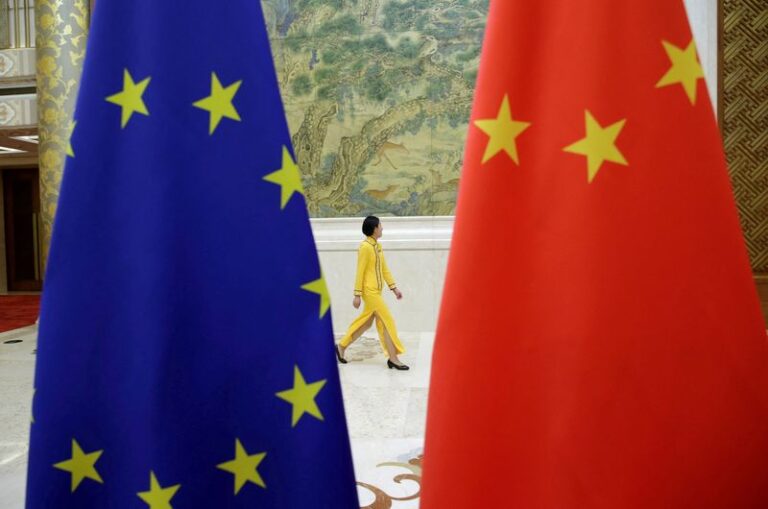SHANGHAI/BEIJING (Reuters) – Chinese automakers have asked China to raise tariffs on imported European gasoline cars in retaliation for European Union (EU) restrictions on exports of Chinese-made electric vehicles (EVs), state-run Global Times newspaper reported on Wednesday.
At a closed-door meeting on Tuesday, also attended by European automakers, the Chinese auto industry reportedly “urged the government to take firm countermeasures and proposed positively considering raising provisional tariffs on gasoline-fueled vehicles with large-displacement engines.”
The meeting was hosted in Beijing by China’s Ministry of Commerce and attended by SAIC Motor, BYD, BMW, Volkswagen and Porsche, according to two people familiar with the matter.
The main aim of the meeting is to put pressure on Europe and lobby against tariffs announced by the EU last week to protect the European car industry from Chinese competition, they added.
The ministry did not immediately respond to a faxed request for comment.
The EU process allows for review, which is why both Europe and China have reason to want to reach a deal in the coming months to ease tensions and avoid billions of dollars in new costs for Chinese EV makers, industry sources said.
The European Commission said on Wednesday it was investigating the situation “with a view to discussing whether a mutually agreeable solution can be found.”
EU trade policy has turned increasingly protectionist amid concerns that China’s production-focused, debt-driven development model will flood the 27-nation bloc with cheap goods, including electric vehicles, as slumping domestic demand forces Chinese companies to expand sales overseas.
The European Commission announced on June 12 that it would impose anti-subsidy tariffs of up to 38.1% on imports of Chinese-made EVs from July. This follows the US’s move to increase tariffs on Chinese cars in May, opening a new phase in the trade war between Western countries and Beijing.
“Personally, I think it’s unfair to start a tariff war just because of (China’s) production capacity utilization rate and China’s lack of demand for new energy vehicles,” said Zhang Yansheng, chief researcher at the China Center for International Economic Exchanges.
“We can see that China has adopted a series of policies to solve the ‘overcapacity’ problem, so China’s capacity utilization rate will continue to rise this year, next year and over the next four years,” he added.
Hostile Hints
The Global Times was the first to report at the end of last month that the Chinese government’s Automotive Research Center was proposing to China that import tariffs on gasoline sedans and sports utility vehicles with engines of 2.5 liters or more be raised from the current 15% to 25%.
Chinese authorities have previously hinted at possible retaliatory measures in commentary in state media and interviews with industry insiders.
The paper also suggested last month that Chinese companies planned to ask authorities to open an anti-dumping investigation into European pork products, and China’s Commerce Ministry announced on Monday that it would launch an investigation.
It also called on Beijing to investigate dairy imports from the EU.
Big cars, big business
According to data from the China Passenger Car Association, exports of passenger cars with engines over 2.5 liters from Europe to China in 2023 totaled 196,000 units, up 11% year-on-year. In the first four months of 2024, exports of such vehicles from Europe to China were 44,000 units, down 12% year-on-year.
According to Eurostat figures, EU car exports to China will be worth 19.4 billion euros ($20.8 billion) in 2023, and the EU will buy 9.7 billion euros of electric vehicles from China.
China accounts for about 30 percent of sales for German automakers, and Germany is by far the largest exporter of cars with engines over 2.5 liters, sending $1.2 billion worth of cars to China since the beginning of the year, according to Chinese customs data.
According to data tracked by China Merchants Bank International, the top three most popular European imports in China are the Mercedes-Benz GLE-Class large SUV, the S-Class sedan and the Porsche Cayenne, which together accounted for more than a fifth of the total 155,841 European brand imports in the first five months of the year.
Slovakia is the fourth largest exporter of large-engine vehicles to China and the second largest in the EU. This year, the country exported $803 million worth of sports utility vehicles.
The United States, Britain and Japan are all large exporters of cars with engines larger than 2.5 liters and are likely to benefit most from the proposed tariff increases.
(1 dollar = 0.9314 euros)
(Reporting by Zhang Yang in Shanghai and Joe Cash in Beijing; Additional reporting by Ella Kao, Albie Zhang, Bernard Orr and Philip Blenkinsop in Brussels; Writing by Joe Cash; Editing by Anne-Marie Roantree, Kim Coghill and Jamie Freed)

